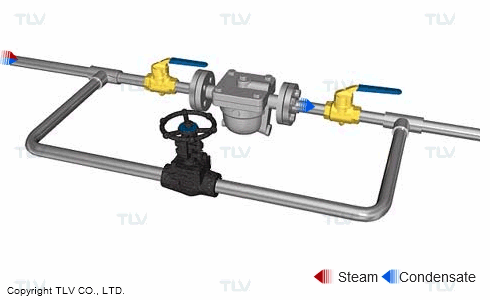The purpose of a bypass valve
A bypass valve is mounted in a so-called bypass loop that allows an instrument, control valve or other device to be bypassed. Most bypass loops are installed to keep a plant operating during maintenance.
The term bypass valve refers to any valve installed in a bypass line, and is not used to indicate a particular valve shape or configuration.
Example..A control valve in a pipeline controls the flow in that pipe, or the pressure. If it must be removed for maintenance or replacement, a method is needed to prevent the plant from shutting down and draining the pipe.
This is accomplished by isolation valves on either side of the control valve, and a bypass line running around all three valves with a bypass valve in it. The isolation valves and bypass valves are operated manually, by handwheels. Furthermore, the bypass valve will usually have the same characteristics as the control valve, in terms of valve and seat.
Bypass Loop
 1 = Bypass valve | 2 = Isolation valve | 3 = Control valve
1 = Bypass valve | 2 = Isolation valve | 3 = Control valve
In normal operation, the isolation valves are open and the bypass valve is closed. If the control valve must be replaced, it must be taken out of service. An operator will gradually open the bypass valve while closing the control valve, if it has a handwheel for manual operation, otherwise close one of the isolation valves.
Flow is gradually transferred from the main line to the bypass line. There is usually an instrument that indicates the flow or pressure and that the operator can observe as he does so.
Once the flow is completely transferred to the bypass valve, both isolation valves are closed and the control valve is drained (or vented) through a small drain valve installed for this purpose. The control valve is now ready for maintenance.
 Image animation..www.tlv.com
Image animation..www.tlv.com
This is the normal meaning of a bypass valve, but it can also have other functions, such as to bypass an entire unit or process. But this is normally used during startup or shutdown. In that case, the bypass valve could be a bypass valve.